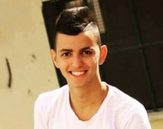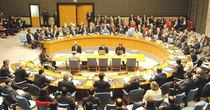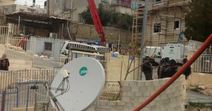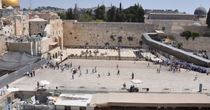26 mar 2017

Five teenagers were on their way back from Ramallah city last Thursday evening, heading home to al-Jalazone refugee camp, when Israeli forces opened fire at the teens on the main road that separates the camp from the nearby illegal Israeli settlement of Beit El.
One teen, Mohammed Mahmoud Ibrahim Hatab, 17, was shot dead by Israeli forces. Two others were critically injured, eighteen-year-olds Jassem Muhammed Nakhla, and Mohammed Hatab (a cousin sharing the same name of the young man who was killed), while a fourth youth suffered bullet wounds but is in stable condition, a medical source at the Ramallah government hospital told Mondoweiss. The driver, the oldest of the five at 19, suffered from light shrapnel wounds.
Beit El is an Israeli settlement that has gotten direct support from Donald Trump’s adviser and son-in-law Jared Kushner and from the new U.S. ambassador to Israel, David Friedman.
An Israeli army spokesperson said: “Three suspects exited a vehicle adjacent to the community of Beit El, where suspects threw firebombs at the community. In response to the threat, Israeli forces in the area fired towards the suspects, and several hits were confirmed. The suspects then fled the scene.”
Evidence of the scene directly contradicts the army’s statement. The car the teens were driving was riddled with bullet holes and the seats and floor of the car saturated with blood, indicating that forces shot at the teens when they were seated in the car, not standing on the side of the road. When asked about the discrepancy, the spokesperson could not comment.
Locals pointed out that if the teens had indeed thrown a Molotov cocktail, they could not have done so from inside a car.
“To throw a Molotov you have to be delicate, it’s fire and gasoline, you have to lift your arm back like this,” one young Palestinian told Mondoweiss, stretching his arm straight back behind him. “There’s no way to do that from a car.”
Nidal Rumah, a resident of al-Jalazone, said that after Israeli forces shot at the teen’s vehicle, the driver was able to navigate into the refugee camp, where residents rushed outside to help.
“Thank god the driver was able to make it into the camp, everyone came out and we discovered that Mohammed was dead, but the other three were alive, just injured,” Rumah said. “The five were cousins and friends, they were coming from Ramallah. By luck the driver was able to make it into the camp after what happened. When he got to the camp he crashed into a wall and people knew something was wrong and rushed out.”
A friend of one of the teens, who asked to remain anonymous, told Mondoweiss he strongly believed that if the driver had been more seriously injured and unable to drive, all five teens would have been killed.
According to Israeli military protocol, Israeli forces are only allowed to shoot live rounds in the case of a threat to life.
Standing at the main street where the boys were shot, it’s objectively clear that it would be impossible for one to, from the road where the Israeli spokesperson said the teens were standing, throw a Molotov anywhere near the settlement or its residents. One would have to go into a field between the main road and the settlement to get into range.
It is unknown if Israeli authorities have video footage of the incident, which took place near an Israeli military tower.
Since the incident happened on Thursday evening, residents of al-Jalazone camp have been waiting outside the Ramallah government hospital, praying for good news on the two teens in critical condition.
A medical source at the hospital said that the two are in critical, but fairly stable condition. However, doctors fear deadly complications could arise.
On Friday morning the funeral for Mohammed Mahmoud began from the hospital. A procession of cars driven by loved ones escorted the ambulance carrying the teen’s remains the 4-and-1/2 miles back to al-Jalazone refugee camp.
Three crying teens held onto the back of the ambulance, balancing on the vehicle’s bumper and refusing to let go — these inconsolable teens clutched the back of the ambulance the entire way to camp.
At least 8,000 mourners attended the funeral in the camp. Flags of the Fatah movement, the political party supported by Mohammed Mahmoud’s family, were waved throughout the crowd, along with flags from Hamas and the Islamic Jihad.
During the procession, thousands of faces, many tear-stained, screamed political slogans, demanding justice. The speedy tick of semi-automatic weapons being shot into the air by Palestinian militants was present throughout the funeral march, as Palestinians clad in green army fatigues shot off M16s from the crowd and surrounding rooftops.
When mourners reached the cemetery, family members had to hold back the mother of the slain teen, who hurled herself toward the grave of her son in grief.
Several mourners had to be carried to ambulances stationed on the streets of the camp where they were treated for faintness or loss of consciousness.
Dr. Jamal al-Haysen, a member of the central committee of the Fatah movement, was one of several leaders to give a speech at the funeral.
“Today we are sending to heaven the martyr Mohammed Hatab, a member of the al-Shabibi Fatah youth party,” al-Haysen began his speech. “This is one of the daily violent actions that the Israeli occupation takes against the Palestinians people — killing our innocent youth — and in the name of the Palestinian people we call for the popular resistance.”
“Israel accuses us of terrorism, but the biggest perpetrator of terrorism is Israel, who keeps killing our people in this genocide,” he continued, and called for support from other Arab nations. “… We have been living through this violence for more than 50 years since the Nakba (1948). We are fighting an enemy who doesn’t respect International Law or International Human Rights.”
Al-Haysen ended his speech wishing a speedy recovery to the three teens still being treated in the hospital.
The 17-year-old was the 15th Palestinian to be killed by Israeli forces in the first eleven weeks of 2017, and the third minor, according to local Ma’an News documentation.
One teen, Mohammed Mahmoud Ibrahim Hatab, 17, was shot dead by Israeli forces. Two others were critically injured, eighteen-year-olds Jassem Muhammed Nakhla, and Mohammed Hatab (a cousin sharing the same name of the young man who was killed), while a fourth youth suffered bullet wounds but is in stable condition, a medical source at the Ramallah government hospital told Mondoweiss. The driver, the oldest of the five at 19, suffered from light shrapnel wounds.
Beit El is an Israeli settlement that has gotten direct support from Donald Trump’s adviser and son-in-law Jared Kushner and from the new U.S. ambassador to Israel, David Friedman.
An Israeli army spokesperson said: “Three suspects exited a vehicle adjacent to the community of Beit El, where suspects threw firebombs at the community. In response to the threat, Israeli forces in the area fired towards the suspects, and several hits were confirmed. The suspects then fled the scene.”
Evidence of the scene directly contradicts the army’s statement. The car the teens were driving was riddled with bullet holes and the seats and floor of the car saturated with blood, indicating that forces shot at the teens when they were seated in the car, not standing on the side of the road. When asked about the discrepancy, the spokesperson could not comment.
Locals pointed out that if the teens had indeed thrown a Molotov cocktail, they could not have done so from inside a car.
“To throw a Molotov you have to be delicate, it’s fire and gasoline, you have to lift your arm back like this,” one young Palestinian told Mondoweiss, stretching his arm straight back behind him. “There’s no way to do that from a car.”
Nidal Rumah, a resident of al-Jalazone, said that after Israeli forces shot at the teen’s vehicle, the driver was able to navigate into the refugee camp, where residents rushed outside to help.
“Thank god the driver was able to make it into the camp, everyone came out and we discovered that Mohammed was dead, but the other three were alive, just injured,” Rumah said. “The five were cousins and friends, they were coming from Ramallah. By luck the driver was able to make it into the camp after what happened. When he got to the camp he crashed into a wall and people knew something was wrong and rushed out.”
A friend of one of the teens, who asked to remain anonymous, told Mondoweiss he strongly believed that if the driver had been more seriously injured and unable to drive, all five teens would have been killed.
According to Israeli military protocol, Israeli forces are only allowed to shoot live rounds in the case of a threat to life.
Standing at the main street where the boys were shot, it’s objectively clear that it would be impossible for one to, from the road where the Israeli spokesperson said the teens were standing, throw a Molotov anywhere near the settlement or its residents. One would have to go into a field between the main road and the settlement to get into range.
It is unknown if Israeli authorities have video footage of the incident, which took place near an Israeli military tower.
Since the incident happened on Thursday evening, residents of al-Jalazone camp have been waiting outside the Ramallah government hospital, praying for good news on the two teens in critical condition.
A medical source at the hospital said that the two are in critical, but fairly stable condition. However, doctors fear deadly complications could arise.
On Friday morning the funeral for Mohammed Mahmoud began from the hospital. A procession of cars driven by loved ones escorted the ambulance carrying the teen’s remains the 4-and-1/2 miles back to al-Jalazone refugee camp.
Three crying teens held onto the back of the ambulance, balancing on the vehicle’s bumper and refusing to let go — these inconsolable teens clutched the back of the ambulance the entire way to camp.
At least 8,000 mourners attended the funeral in the camp. Flags of the Fatah movement, the political party supported by Mohammed Mahmoud’s family, were waved throughout the crowd, along with flags from Hamas and the Islamic Jihad.
During the procession, thousands of faces, many tear-stained, screamed political slogans, demanding justice. The speedy tick of semi-automatic weapons being shot into the air by Palestinian militants was present throughout the funeral march, as Palestinians clad in green army fatigues shot off M16s from the crowd and surrounding rooftops.
When mourners reached the cemetery, family members had to hold back the mother of the slain teen, who hurled herself toward the grave of her son in grief.
Several mourners had to be carried to ambulances stationed on the streets of the camp where they were treated for faintness or loss of consciousness.
Dr. Jamal al-Haysen, a member of the central committee of the Fatah movement, was one of several leaders to give a speech at the funeral.
“Today we are sending to heaven the martyr Mohammed Hatab, a member of the al-Shabibi Fatah youth party,” al-Haysen began his speech. “This is one of the daily violent actions that the Israeli occupation takes against the Palestinians people — killing our innocent youth — and in the name of the Palestinian people we call for the popular resistance.”
“Israel accuses us of terrorism, but the biggest perpetrator of terrorism is Israel, who keeps killing our people in this genocide,” he continued, and called for support from other Arab nations. “… We have been living through this violence for more than 50 years since the Nakba (1948). We are fighting an enemy who doesn’t respect International Law or International Human Rights.”
Al-Haysen ended his speech wishing a speedy recovery to the three teens still being treated in the hospital.
The 17-year-old was the 15th Palestinian to be killed by Israeli forces in the first eleven weeks of 2017, and the third minor, according to local Ma’an News documentation.
25 mar 2017

Israeli soldiers and military engineers installed, Saturday, several surveillance cameras in, and near, villages in the occupied West Bank, in order, according to a military statement, to use them in uncovering and attempting to prevent Palestinian attacks against the soldiers and settlers.
The soldiers installed several cameras on a main road near Janata village, east of Bethlehem, hundreds of meters away from a road used by soldiers and colonialist settlers, especially those heading to Teqoua’ illegal colony.
The soldiers also installed surveillance cameras near Kifl Haris village, south of Nablus, in the northern part of the West Bank.
Israel has hundreds of surveillance cameras on main roads and junctions, in several areas of the occupied West Bank, as the roads are used by both the military army and colonist settlers, but this marks the first time that such cameras are actually installed inside Palestinian villages, not even used by the settlers.
The Israeli army also increased its military deployments on roads where cameras have been installed, apparently in an effort to prevent attempts to destroy them.
The soldiers installed several cameras on a main road near Janata village, east of Bethlehem, hundreds of meters away from a road used by soldiers and colonialist settlers, especially those heading to Teqoua’ illegal colony.
The soldiers also installed surveillance cameras near Kifl Haris village, south of Nablus, in the northern part of the West Bank.
Israel has hundreds of surveillance cameras on main roads and junctions, in several areas of the occupied West Bank, as the roads are used by both the military army and colonist settlers, but this marks the first time that such cameras are actually installed inside Palestinian villages, not even used by the settlers.
The Israeli army also increased its military deployments on roads where cameras have been installed, apparently in an effort to prevent attempts to destroy them.
24 mar 2017

The UN Human Rights Council (UNHRC) adopted, during its 34th session held on Friday in Geneva, four pro-Palestine and anti-occupation resolutions.
The Palestinian Foreign Minister Riyad al-Maliki said that the four adopted resolutions are entitled “Israeli settlements in the Occupied Palestinian Territory, including East Jerusalem, The Palestinian people's right to self-determination, The situation of human rights in the Occupied Palestinian Territory, including East Jerusalem, and Violations of international law in the occupied Palestinian territory.”
"The Palestinian draft resolutions were reformulated according to the rules of the international laws in accordance with the Palestinian national demands to hold Israeli leaders accountable for committing war crimes against our people," he said.
Al-Maliki strongly denounced the statements made by the Israeli ambassador to the UNHRC, stressing that Israel’s illegal practices on the ground violate the international law.
He invited all countries that had voted against the resolutions to review their positions and to stand behind the principles of international law.
He also stressed the urgent need to prosecute Israel for violating international laws and principles, and to provide international protection for the Palestinian people.
The Palestinian Foreign Minister Riyad al-Maliki said that the four adopted resolutions are entitled “Israeli settlements in the Occupied Palestinian Territory, including East Jerusalem, The Palestinian people's right to self-determination, The situation of human rights in the Occupied Palestinian Territory, including East Jerusalem, and Violations of international law in the occupied Palestinian territory.”
"The Palestinian draft resolutions were reformulated according to the rules of the international laws in accordance with the Palestinian national demands to hold Israeli leaders accountable for committing war crimes against our people," he said.
Al-Maliki strongly denounced the statements made by the Israeli ambassador to the UNHRC, stressing that Israel’s illegal practices on the ground violate the international law.
He invited all countries that had voted against the resolutions to review their positions and to stand behind the principles of international law.
He also stressed the urgent need to prosecute Israel for violating international laws and principles, and to provide international protection for the Palestinian people.
22 mar 2017

Israeli police forces sealed slain Palestinian Fadi Qanbar’s home in the occupied Jerusalem neighborhood of Jabal al-Mukabbir on Wednesday morning with concrete, local sources affirmed.
Since the early morning hours, Israeli forces stormed the area and erected a number of military checkpoints near the house before starting to pour concrete inside it.
A reconnaissance plane was seen flying over the area, the sources added.
During the raid, Israeli forces arrested Qanbar’s father and brother and took them to Maskoubia investigation center, west of Jerusalem.
Five Palestinians had been living in the house, Qanbar’s wife and four children, the eldest of which is seven years old while the youngest is nine months old.
Israeli forces have repeatedly raided the home in recent weeks threatening to demolish it, most recently last week when cement mixers were brought in, though the forces later retreated from the area after apparently having difficulty accessing the home, according to witnesses.
Qanbar was shot dead by Israeli forces in January after he allegedly drove a truck into a group of Israeli soldiers.
Since the early morning hours, Israeli forces stormed the area and erected a number of military checkpoints near the house before starting to pour concrete inside it.
A reconnaissance plane was seen flying over the area, the sources added.
During the raid, Israeli forces arrested Qanbar’s father and brother and took them to Maskoubia investigation center, west of Jerusalem.
Five Palestinians had been living in the house, Qanbar’s wife and four children, the eldest of which is seven years old while the youngest is nine months old.
Israeli forces have repeatedly raided the home in recent weeks threatening to demolish it, most recently last week when cement mixers were brought in, though the forces later retreated from the area after apparently having difficulty accessing the home, according to witnesses.
Qanbar was shot dead by Israeli forces in January after he allegedly drove a truck into a group of Israeli soldiers.
21 mar 2017

The Israeli municipality announced the launch of a series of Judaization shows across Jerusalem to mark the 50th anniversary of the occupation of the holy city.
The events kicked off on Monday evening and will be wrapped up next Thursday.
Israel’s Jerusalem committee, chaired by Prime Minister Benjamin Netanyahu, gave instructions to hold Judaization events so as to impose a new fait accompli on East Occupied Jerusalem and the Old City.
Cultural shows, political forums, artistic performances, choreographies, and sports events are expected to take place as part of Israeli intents to confer “an Israeli flair” upon the holy city of Jerusalem, a home to the third holiest site in Islam—al-Aqsa Mosque.
The events make part of the 50th anniversary of the occupation of Jerusalem annually marked by Israel.
The events kicked off on Monday evening and will be wrapped up next Thursday.
Israel’s Jerusalem committee, chaired by Prime Minister Benjamin Netanyahu, gave instructions to hold Judaization events so as to impose a new fait accompli on East Occupied Jerusalem and the Old City.
Cultural shows, political forums, artistic performances, choreographies, and sports events are expected to take place as part of Israeli intents to confer “an Israeli flair” upon the holy city of Jerusalem, a home to the third holiest site in Islam—al-Aqsa Mosque.
The events make part of the 50th anniversary of the occupation of Jerusalem annually marked by Israel.

The head of Israel's Shin Bet internal security service warned Monday of being complacent of the "relative calm" prevailing in the Israeli and Palestinian territories, especially in the West Bank.
Speaking to parliament's foreign affairs and defense committee, Shin Bet chief Nadav Argaman told lawmakers not to be fooled by the "current relative calm".
The situation, he said in remarks conveyed by Israel’s public Hebrew radio, "is deceptive,” claiming that Hamas and what he called global jihadists constantly try to attack Israel.
Argaman boastfully said the relative calm was the result of new "anti-terrorism" methods adopted by the Shin Bet.
"We have learned to confront individual terrorism and made changes thanks to technological, operational and intelligence developments," he claimed.
Argaman added that Shin Bet had arrested more than 400 would-be assailants before they were able to take action.
Since the start of the Jerusalem Intifada (uprising) in early October 2015, dozens of individual counterattacks have been carried out by Palestinian citizens, mostly young men, in response to Israeli crimes against their fellow citizens and daily violations by Jewish settlers and the police at the Aqsa Mosque.
Speaking to parliament's foreign affairs and defense committee, Shin Bet chief Nadav Argaman told lawmakers not to be fooled by the "current relative calm".
The situation, he said in remarks conveyed by Israel’s public Hebrew radio, "is deceptive,” claiming that Hamas and what he called global jihadists constantly try to attack Israel.
Argaman boastfully said the relative calm was the result of new "anti-terrorism" methods adopted by the Shin Bet.
"We have learned to confront individual terrorism and made changes thanks to technological, operational and intelligence developments," he claimed.
Argaman added that Shin Bet had arrested more than 400 would-be assailants before they were able to take action.
Since the start of the Jerusalem Intifada (uprising) in early October 2015, dozens of individual counterattacks have been carried out by Palestinian citizens, mostly young men, in response to Israeli crimes against their fellow citizens and daily violations by Jewish settlers and the police at the Aqsa Mosque.
